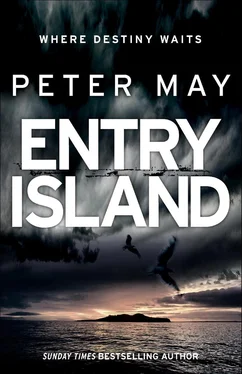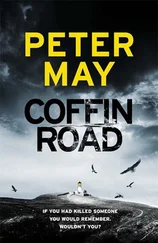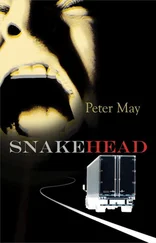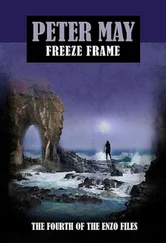‘Well a patrolman would carry a Glock 17. But detectives like me carry the Glock 26.’
‘How many rounds?’
‘Thirteen. You interested in guns, Luc?’
‘You bet.’
He shrugged. ‘Then maybe I can take you to the police shooting range one day and you can have a shot at firing one yourself.’
‘No shit?’
‘Luc!’ his father reprimanded him.
‘Sorry,’ the boy said. But he wasn’t. ‘That would be brilliant.’
Sime glanced at Annie and saw the pleasure in her smile. He knew she didn’t approve of guns, but anything that made connections and brought the family together had to be good.
He spent the rest of the meal fielding questions about cases he had worked on, murders that they had read about in the papers or seen on TV. From the family pariah he had suddenly become exotic and interesting, at least as far as the kids were concerned. Gilles was more reserved. But just before Annie took him upstairs to show him his room, Gilles solemnly shook his hand and said, ‘It’s good to have you here, Sime.’
Sime’s room was up in the roof, with a dormer window looking out over the garden below. Annie switched on a bedside light and laid out the diaries on the bed in chronological order. He watched her with both apprehension and anticipation. He couldn’t wait to read them, but at the same time feared that perhaps they would not provide the illumination he sought. About the ring that had first sparked his dreams, and its possible connections to a woman charged with murder on Entry Island.
Annie lifted the final diary and turned towards him. ‘After you phoned,’ she said, ‘I dug these out and spent most of the next two days reading them. I can’t tell you what memories they brought back. I could almost smell Granny’s house as I read. And I could hear that distinctive little creak she used to have in her voice when she was reading.’ She paused. ‘You know she didn’t read us everything?’
He nodded. ‘I knew there was stuff our folks didn’t want us to hear. I can’t imagine what, though.’
‘You’ll figure it out when you read for yourself,’ Annie said. ‘But you mentioned the ring when you phoned, and that’s what I focused on.’ She searched his face with dark green, puzzled eyes, then opened up the diary that she held in her hands and searched through it for a page she had marked with a Post-it. ‘His entries became more and more infrequent before he stopped altogether. But you should read first from here, Sime. Granny never read us any of this. If she had I’m sure you’d have remembered the significance of the ring.’ She handed him the diary. ‘When you’ve read to the end, you can go back and follow the trail from the beginning. I think you’ll know where to look.’
She reached up and kissed him softly on the cheek.
‘I hope you’ll find resolution here.’
When she had gone, Sime stood for a while listening to the silence of the room around him. Somewhere outside he heard the hoot of a distant owl. The diary seemed to grow heavier as he stood there with it in his hands, before eventually he pulled up the chair at a small writing desk below the dormer.
He sat down and turned on the reading light. Then carefully opened the diary at the page she had marked and began to read.
Thursday, 19th May 1853
I have floored the beams now in the pitch of my cabin roof to make an attic. I have built a spare room and indoor toilet at the back, and a covered porch with fly screens at the front. I often sit on the porch at the end of the day and watch the sun set over the trees, and I dream about how things might have been had I not been separated from Ciorstaidh on the quay at Glasgow that fateful day.
I have cleared and ploughed most of my land, and grow enough to feed myself with some left over to sell. At certain times of the year, myself and a few of the other men from Gould walk across the border to earn a bit of cash on the bigger farms at Vermont in the United States. At others I am busy enough on my own land. Especially at harvest time when I have to rush to bring in the crops before the first frosts, which can come as early as September.
Recently I have obtained part-time work teaching English to the Gaelic-speaking children at Gould school. Most of them arrive having spoken only Gaelic in the home, but when it comes to learning to read and write, it’s in English that they must do it.
The reason I write about this today is that a remarkable thing happened at the school just yesterday morning.
There is a new teacher this year, Jean Macritchie. She’s married to Angus Macritchie, the mayor of the Lingwick municipality. She’s a very genteel sort of lady. In her mid-forties, I would say. No airs and graces about her, but polite and softly spoken. She wears print cotton dresses and silk shawls and has a sort of artistic air about her. In fact, art is her great passion, and she has instituted a new art class for the children.
It was lunchtime yesterday when I finally finished marking some papers and I wandered into her classroom. Everyone had gone to eat, but the still-life that Mrs Macritchie had set up for the children to draw was still there. Just a jug and a glass of water and some fruit. And the efforts of the children themselves were still lying on their desks.
I wandered around looking at them. Most were pretty awful. Some of them even made me laugh. And one or two were quite good. I have no idea what impelled me to do it, for I have never drawn anything in my life, but I had a sudden fancy to see what kind of a fist I could make of it myself. So I got a fresh sheet of paper and some charcoal from Mrs Macritchie’s desk, and sat down to draw.
It’s amazing how I got sucked into it. I don’t know how long I sat there following the lines that my eye guided me to draw, using the flat of the charcoal to create the light and the shade, but I didn’t hear Mrs Macritchie coming in until she spoke. I just about jumped out of my skin. I looked up and there she was peering down at my sketch. ‘How long have you been drawing, Sime?’
‘I’ve no idea,’ I said. ‘About half an hour, maybe.’
She laughed then. ‘No, I mean, is drawing something you’ve been doing for a long time?’
It was my turn to laugh. ‘No, not at all. This is the first I’ve ever done.’
Her smile faded. ‘You’re joking, aren’t you?’
‘Well... no,’ I said, and glanced at my drawing. ‘Is it that bad?’ I was hoping to make her laugh again, but she remained quite serious.
‘I don’t know if you realise it, Sime, but you have a very real talent.’ It was news to me. She clasped her hands thoughtfully in front of her face, resting her fingertips on her lips. ‘What would you say if I offered to give you lessons?’
I looked at her in astonishment. ‘Seriously?’
‘Seriously.’
I thought about it for all of two seconds then nodded my head vigorously. ‘I’d like that.’
Friday, 7th July 1854
Today was the last day of the school term, and the start of the holidays for the children. Of course, it means that my teaching income will dry up till September, and I’ll have to put in a hard summer shift on the land.
It also means putting aside my painting until the start of the new term when I will have time once again. I have taken so much pleasure in the discovery of this unexpected talent. Mrs Macritchie has been very patient this last year, painstaking in teaching me good technique. First in drawing, and then in painting. But it is in the painting that I have found my greatest pleasure. At first I painted the things I saw around me. People and places. And then at some point, I’m not sure exactly when, I began to paint the landscapes that I remembered from home. Baile Mhanais, the castle at Ard Mor. Seascapes, mountains, the bare windswept peat bogs of the Hebrides. These past months I have spent most of my money on materials. Canvas and paints and brushes. I fear it is becoming something of an addiction.
Читать дальше












